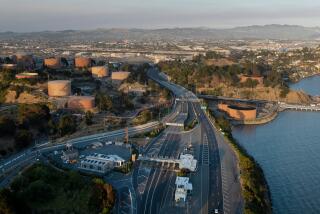Chevron’s shifting defense
- Share via
When Chevron was in a New York courtroom battling a lawsuit by thousands of indigenous Ecuadoreans, it argued that the case rightly belonged in their country. But now that the company is poised to lose in the Andean nation and could be assessed as much as $27 billion in damages, it says Ecuador isn’t the right place either. Last week, the oil giant shopped the case to yet another court, filing a claim at the Permanent Court of Arbitration in The Hague.
Chevron has long maintained that it would appeal an adverse decision, which is entirely understandable. But this action is different. By going to The Hague before a verdict is issued in Ecuador, the company shuts out the private citizens who brought the suit and who have no standing there. This reframes the case as between Ecuador and Chevron, and if it succeeds -- shifting liability from the company to the Ecuadorean government -- it could have a chilling effect on people all over the world who are engaged in legal battles with multinational corporations.
Let’s be clear: The case wasn’t brought by Ecuador. It was filed by people who say they have suffered serious personal harm, illness and environmental damage as a result of oil operations in their homelands. From the very beginning, Chevron has been trying to turn the focus away from these people and to pin the responsibility for the pollution on the government of Ecuador. After the suit was filed, the company got a waiver from Ecuador releasing it from all claims by the government. But the waiver didn’t successfully stop third-party claims. So, in 2004, the company asked a federal court in New York to force Ecuador’s state-owned oil company to indemnify it for any judgment in the case. The court rejected that claim in 2007, and in 2008, a three-judge panel for the U.S. 2nd Circuit Court of Appeals affirmed the ruling.
Now Chevron, which once agreed to abide by the Ecuadorean court’s ruling, says it has no choice but to seek an international remedy in The Hague because it cannot get a fair trial in the Amazon. To bolster that contention, it recently released videotapes that it says depict the judge, Juan Nunez Sanabria, prematurely declaring Chevron’s guilt. The tapes are unclear as to Nunez’s intent, and he maintains that no impropriety occurred. He recused himself from the case to avoid becoming a distraction but has since been reinstated.
The real problem for Chevron, however, isn’t jurisdictional or procedural. Nor is it about biased justice in New York or Ecuador. The issue is the devastating contamination in the Ecuadorean Amazon, the individuals whose lives have been affected and the importance of accountability. No matter where this case is tried, that’s not going to disappear.
More to Read
Sign up for Essential California
The most important California stories and recommendations in your inbox every morning.
You may occasionally receive promotional content from the Los Angeles Times.










